Small Business Management and Entrepreneurship
VerifiedAdded on 2020/10/22
|16
|4737
|201
AI Summary
The provided text is an excerpt from a past paper or assignment on small business management and entrepreneurship. It covers topics such as business model innovation, entrepreneurial marketing, microfinance clients, and human capital in entrepreneurship. The text also includes references to various academic papers and books on the subject.
Contribute Materials
Your contribution can guide someone’s learning journey. Share your
documents today.

ENTREPRENEURSHIP
1
1
Secure Best Marks with AI Grader
Need help grading? Try our AI Grader for instant feedback on your assignments.
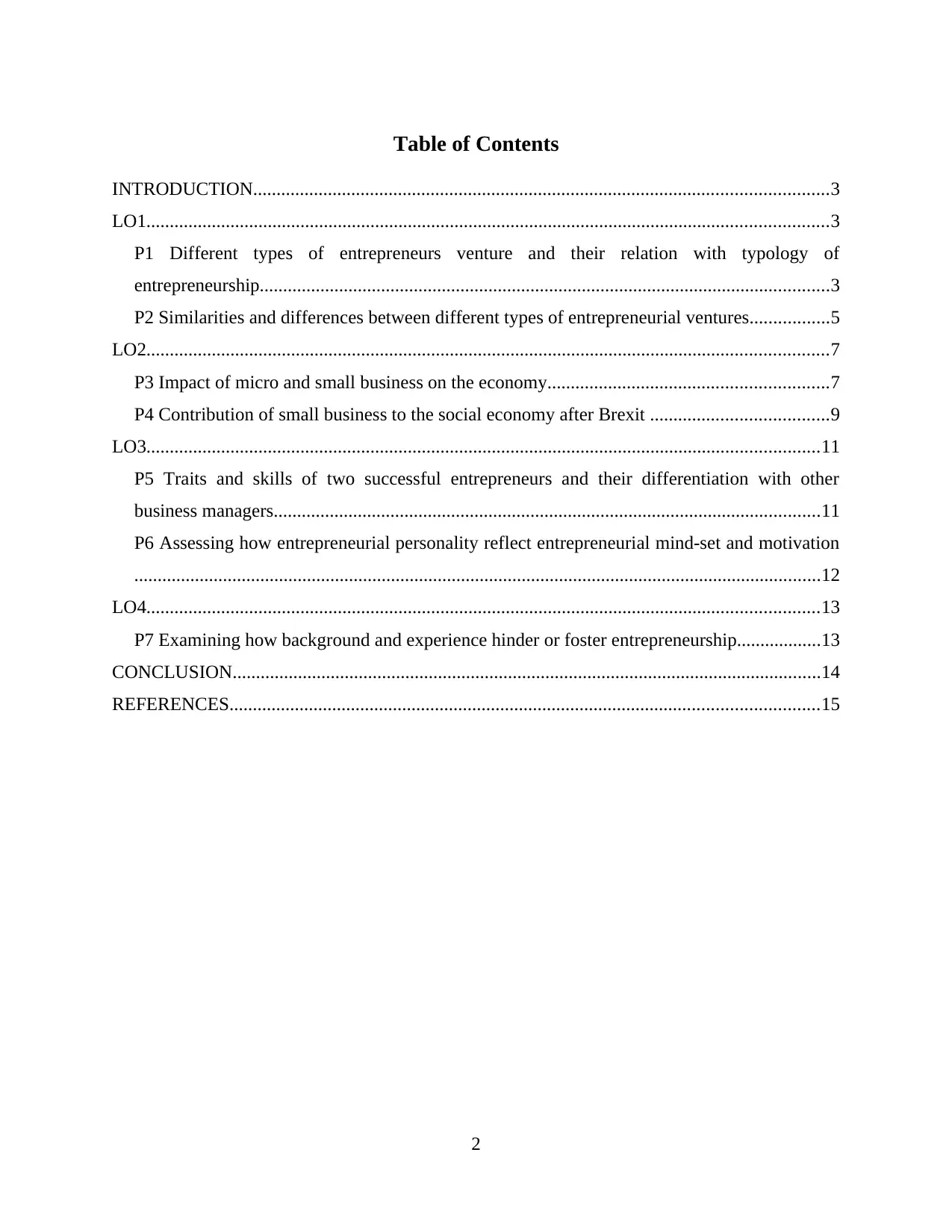
Table of Contents
INTRODUCTION...........................................................................................................................3
LO1..................................................................................................................................................3
P1 Different types of entrepreneurs venture and their relation with typology of
entrepreneurship..........................................................................................................................3
P2 Similarities and differences between different types of entrepreneurial ventures.................5
LO2..................................................................................................................................................7
P3 Impact of micro and small business on the economy............................................................7
P4 Contribution of small business to the social economy after Brexit ......................................9
LO3................................................................................................................................................11
P5 Traits and skills of two successful entrepreneurs and their differentiation with other
business managers.....................................................................................................................11
P6 Assessing how entrepreneurial personality reflect entrepreneurial mind-set and motivation
...................................................................................................................................................12
LO4................................................................................................................................................13
P7 Examining how background and experience hinder or foster entrepreneurship..................13
CONCLUSION..............................................................................................................................14
REFERENCES..............................................................................................................................15
2
INTRODUCTION...........................................................................................................................3
LO1..................................................................................................................................................3
P1 Different types of entrepreneurs venture and their relation with typology of
entrepreneurship..........................................................................................................................3
P2 Similarities and differences between different types of entrepreneurial ventures.................5
LO2..................................................................................................................................................7
P3 Impact of micro and small business on the economy............................................................7
P4 Contribution of small business to the social economy after Brexit ......................................9
LO3................................................................................................................................................11
P5 Traits and skills of two successful entrepreneurs and their differentiation with other
business managers.....................................................................................................................11
P6 Assessing how entrepreneurial personality reflect entrepreneurial mind-set and motivation
...................................................................................................................................................12
LO4................................................................................................................................................13
P7 Examining how background and experience hinder or foster entrepreneurship..................13
CONCLUSION..............................................................................................................................14
REFERENCES..............................................................................................................................15
2
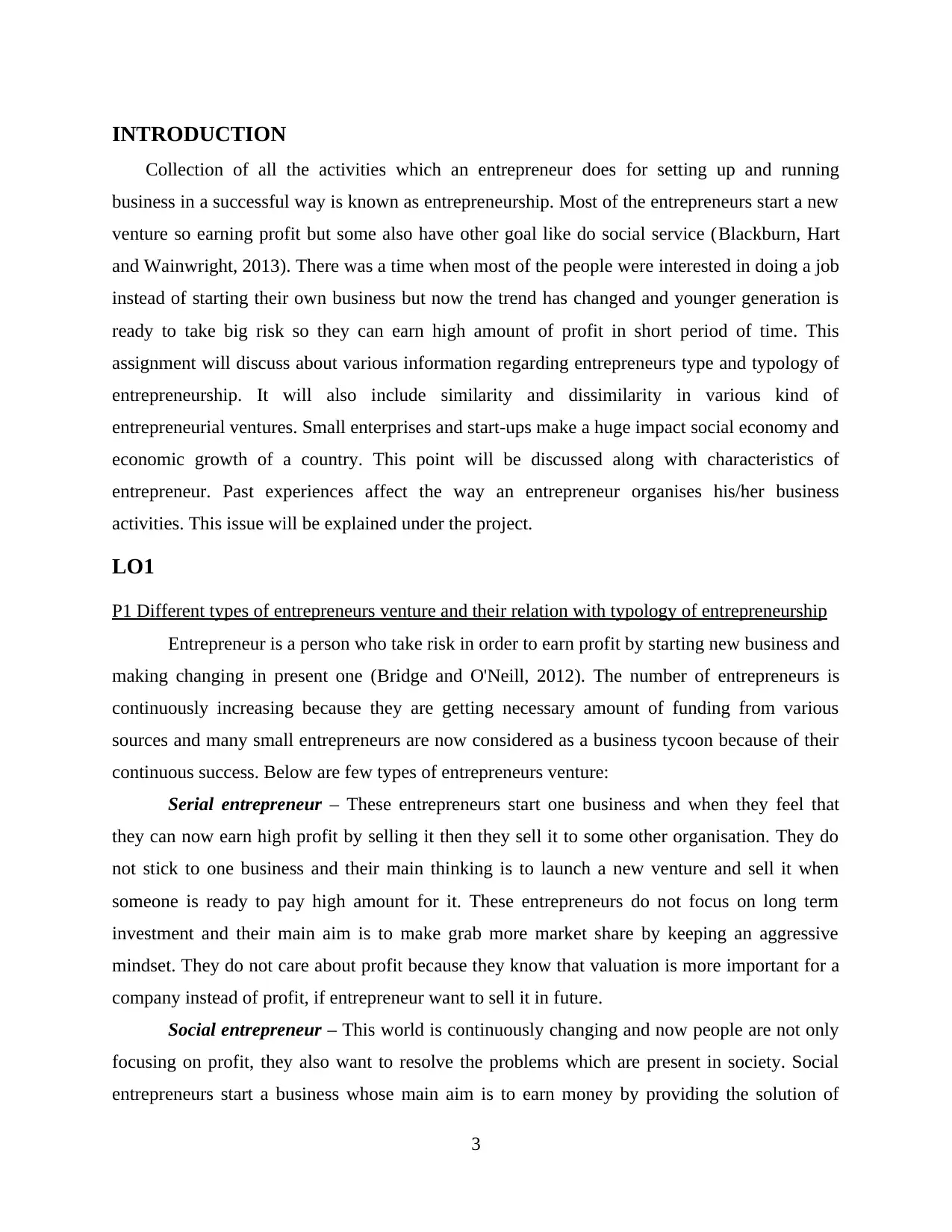
INTRODUCTION
Collection of all the activities which an entrepreneur does for setting up and running
business in a successful way is known as entrepreneurship. Most of the entrepreneurs start a new
venture so earning profit but some also have other goal like do social service (Blackburn, Hart
and Wainwright, 2013). There was a time when most of the people were interested in doing a job
instead of starting their own business but now the trend has changed and younger generation is
ready to take big risk so they can earn high amount of profit in short period of time. This
assignment will discuss about various information regarding entrepreneurs type and typology of
entrepreneurship. It will also include similarity and dissimilarity in various kind of
entrepreneurial ventures. Small enterprises and start-ups make a huge impact social economy and
economic growth of a country. This point will be discussed along with characteristics of
entrepreneur. Past experiences affect the way an entrepreneur organises his/her business
activities. This issue will be explained under the project.
LO1
P1 Different types of entrepreneurs venture and their relation with typology of entrepreneurship
Entrepreneur is a person who take risk in order to earn profit by starting new business and
making changing in present one (Bridge and O'Neill, 2012). The number of entrepreneurs is
continuously increasing because they are getting necessary amount of funding from various
sources and many small entrepreneurs are now considered as a business tycoon because of their
continuous success. Below are few types of entrepreneurs venture:
Serial entrepreneur – These entrepreneurs start one business and when they feel that
they can now earn high profit by selling it then they sell it to some other organisation. They do
not stick to one business and their main thinking is to launch a new venture and sell it when
someone is ready to pay high amount for it. These entrepreneurs do not focus on long term
investment and their main aim is to make grab more market share by keeping an aggressive
mindset. They do not care about profit because they know that valuation is more important for a
company instead of profit, if entrepreneur want to sell it in future.
Social entrepreneur – This world is continuously changing and now people are not only
focusing on profit, they also want to resolve the problems which are present in society. Social
entrepreneurs start a business whose main aim is to earn money by providing the solution of
3
Collection of all the activities which an entrepreneur does for setting up and running
business in a successful way is known as entrepreneurship. Most of the entrepreneurs start a new
venture so earning profit but some also have other goal like do social service (Blackburn, Hart
and Wainwright, 2013). There was a time when most of the people were interested in doing a job
instead of starting their own business but now the trend has changed and younger generation is
ready to take big risk so they can earn high amount of profit in short period of time. This
assignment will discuss about various information regarding entrepreneurs type and typology of
entrepreneurship. It will also include similarity and dissimilarity in various kind of
entrepreneurial ventures. Small enterprises and start-ups make a huge impact social economy and
economic growth of a country. This point will be discussed along with characteristics of
entrepreneur. Past experiences affect the way an entrepreneur organises his/her business
activities. This issue will be explained under the project.
LO1
P1 Different types of entrepreneurs venture and their relation with typology of entrepreneurship
Entrepreneur is a person who take risk in order to earn profit by starting new business and
making changing in present one (Bridge and O'Neill, 2012). The number of entrepreneurs is
continuously increasing because they are getting necessary amount of funding from various
sources and many small entrepreneurs are now considered as a business tycoon because of their
continuous success. Below are few types of entrepreneurs venture:
Serial entrepreneur – These entrepreneurs start one business and when they feel that
they can now earn high profit by selling it then they sell it to some other organisation. They do
not stick to one business and their main thinking is to launch a new venture and sell it when
someone is ready to pay high amount for it. These entrepreneurs do not focus on long term
investment and their main aim is to make grab more market share by keeping an aggressive
mindset. They do not care about profit because they know that valuation is more important for a
company instead of profit, if entrepreneur want to sell it in future.
Social entrepreneur – This world is continuously changing and now people are not only
focusing on profit, they also want to resolve the problems which are present in society. Social
entrepreneurs start a business whose main aim is to earn money by providing the solution of
3
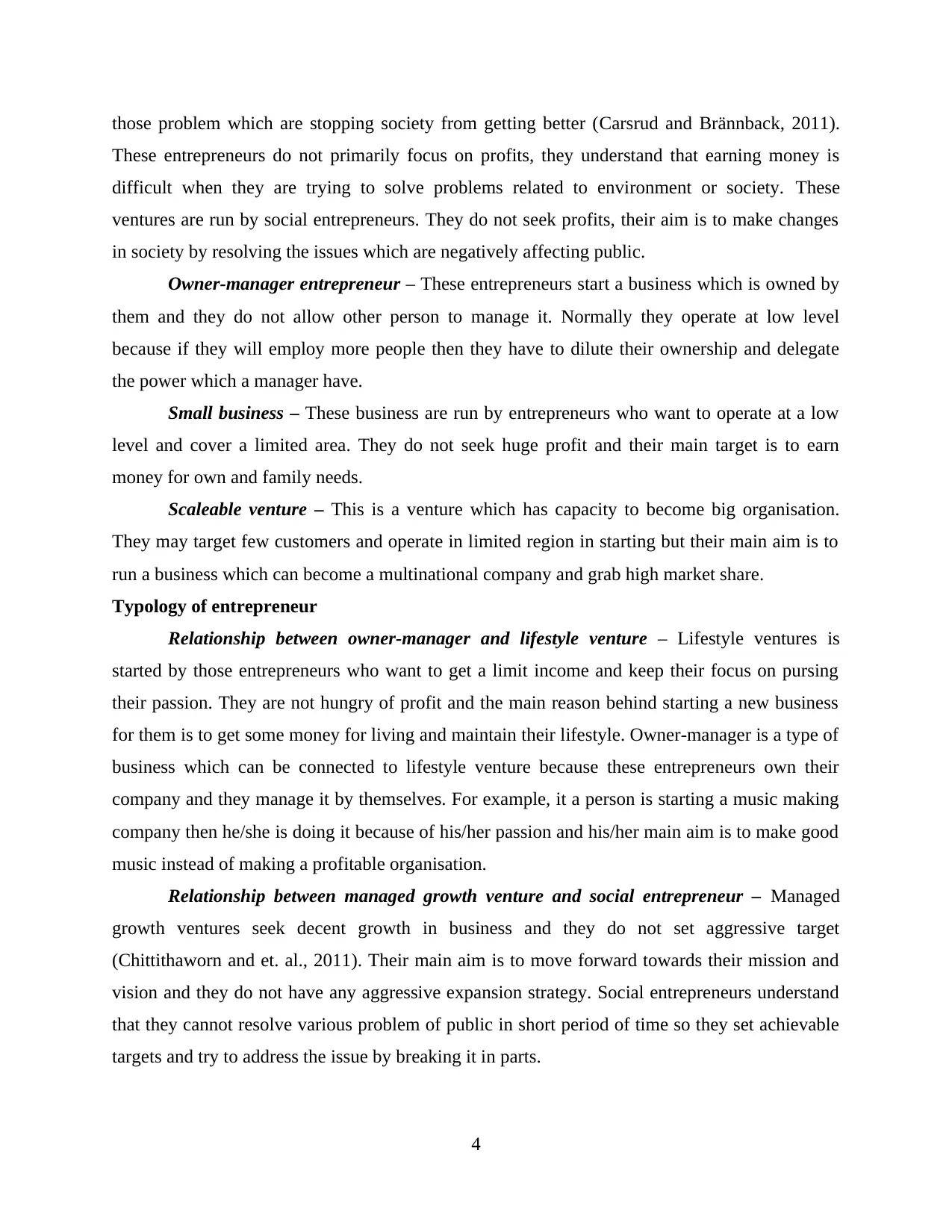
those problem which are stopping society from getting better (Carsrud and Brännback, 2011).
These entrepreneurs do not primarily focus on profits, they understand that earning money is
difficult when they are trying to solve problems related to environment or society. These
ventures are run by social entrepreneurs. They do not seek profits, their aim is to make changes
in society by resolving the issues which are negatively affecting public.
Owner-manager entrepreneur – These entrepreneurs start a business which is owned by
them and they do not allow other person to manage it. Normally they operate at low level
because if they will employ more people then they have to dilute their ownership and delegate
the power which a manager have.
Small business – These business are run by entrepreneurs who want to operate at a low
level and cover a limited area. They do not seek huge profit and their main target is to earn
money for own and family needs.
Scaleable venture – This is a venture which has capacity to become big organisation.
They may target few customers and operate in limited region in starting but their main aim is to
run a business which can become a multinational company and grab high market share.
Typology of entrepreneur
Relationship between owner-manager and lifestyle venture – Lifestyle ventures is
started by those entrepreneurs who want to get a limit income and keep their focus on pursing
their passion. They are not hungry of profit and the main reason behind starting a new business
for them is to get some money for living and maintain their lifestyle. Owner-manager is a type of
business which can be connected to lifestyle venture because these entrepreneurs own their
company and they manage it by themselves. For example, it a person is starting a music making
company then he/she is doing it because of his/her passion and his/her main aim is to make good
music instead of making a profitable organisation.
Relationship between managed growth venture and social entrepreneur – Managed
growth ventures seek decent growth in business and they do not set aggressive target
(Chittithaworn and et. al., 2011). Their main aim is to move forward towards their mission and
vision and they do not have any aggressive expansion strategy. Social entrepreneurs understand
that they cannot resolve various problem of public in short period of time so they set achievable
targets and try to address the issue by breaking it in parts.
4
These entrepreneurs do not primarily focus on profits, they understand that earning money is
difficult when they are trying to solve problems related to environment or society. These
ventures are run by social entrepreneurs. They do not seek profits, their aim is to make changes
in society by resolving the issues which are negatively affecting public.
Owner-manager entrepreneur – These entrepreneurs start a business which is owned by
them and they do not allow other person to manage it. Normally they operate at low level
because if they will employ more people then they have to dilute their ownership and delegate
the power which a manager have.
Small business – These business are run by entrepreneurs who want to operate at a low
level and cover a limited area. They do not seek huge profit and their main target is to earn
money for own and family needs.
Scaleable venture – This is a venture which has capacity to become big organisation.
They may target few customers and operate in limited region in starting but their main aim is to
run a business which can become a multinational company and grab high market share.
Typology of entrepreneur
Relationship between owner-manager and lifestyle venture – Lifestyle ventures is
started by those entrepreneurs who want to get a limit income and keep their focus on pursing
their passion. They are not hungry of profit and the main reason behind starting a new business
for them is to get some money for living and maintain their lifestyle. Owner-manager is a type of
business which can be connected to lifestyle venture because these entrepreneurs own their
company and they manage it by themselves. For example, it a person is starting a music making
company then he/she is doing it because of his/her passion and his/her main aim is to make good
music instead of making a profitable organisation.
Relationship between managed growth venture and social entrepreneur – Managed
growth ventures seek decent growth in business and they do not set aggressive target
(Chittithaworn and et. al., 2011). Their main aim is to move forward towards their mission and
vision and they do not have any aggressive expansion strategy. Social entrepreneurs understand
that they cannot resolve various problem of public in short period of time so they set achievable
targets and try to address the issue by breaking it in parts.
4
Secure Best Marks with AI Grader
Need help grading? Try our AI Grader for instant feedback on your assignments.
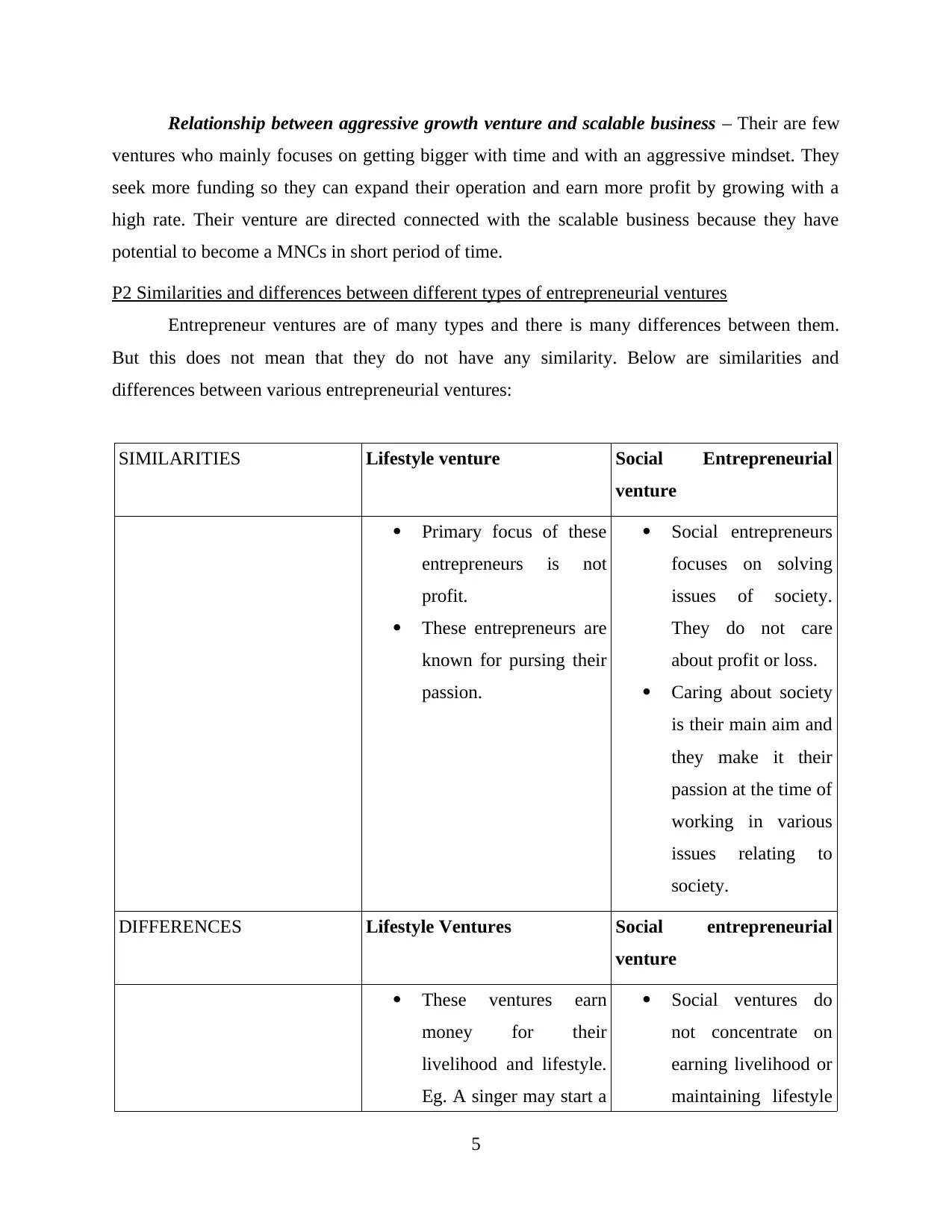
Relationship between aggressive growth venture and scalable business – Their are few
ventures who mainly focuses on getting bigger with time and with an aggressive mindset. They
seek more funding so they can expand their operation and earn more profit by growing with a
high rate. Their venture are directed connected with the scalable business because they have
potential to become a MNCs in short period of time.
P2 Similarities and differences between different types of entrepreneurial ventures
Entrepreneur ventures are of many types and there is many differences between them.
But this does not mean that they do not have any similarity. Below are similarities and
differences between various entrepreneurial ventures:
SIMILARITIES Lifestyle venture Social Entrepreneurial
venture
Primary focus of these
entrepreneurs is not
profit.
These entrepreneurs are
known for pursing their
passion.
Social entrepreneurs
focuses on solving
issues of society.
They do not care
about profit or loss.
Caring about society
is their main aim and
they make it their
passion at the time of
working in various
issues relating to
society.
DIFFERENCES Lifestyle Ventures Social entrepreneurial
venture
These ventures earn
money for their
livelihood and lifestyle.
Eg. A singer may start a
Social ventures do
not concentrate on
earning livelihood or
maintaining lifestyle
5
ventures who mainly focuses on getting bigger with time and with an aggressive mindset. They
seek more funding so they can expand their operation and earn more profit by growing with a
high rate. Their venture are directed connected with the scalable business because they have
potential to become a MNCs in short period of time.
P2 Similarities and differences between different types of entrepreneurial ventures
Entrepreneur ventures are of many types and there is many differences between them.
But this does not mean that they do not have any similarity. Below are similarities and
differences between various entrepreneurial ventures:
SIMILARITIES Lifestyle venture Social Entrepreneurial
venture
Primary focus of these
entrepreneurs is not
profit.
These entrepreneurs are
known for pursing their
passion.
Social entrepreneurs
focuses on solving
issues of society.
They do not care
about profit or loss.
Caring about society
is their main aim and
they make it their
passion at the time of
working in various
issues relating to
society.
DIFFERENCES Lifestyle Ventures Social entrepreneurial
venture
These ventures earn
money for their
livelihood and lifestyle.
Eg. A singer may start a
Social ventures do
not concentrate on
earning livelihood or
maintaining lifestyle
5
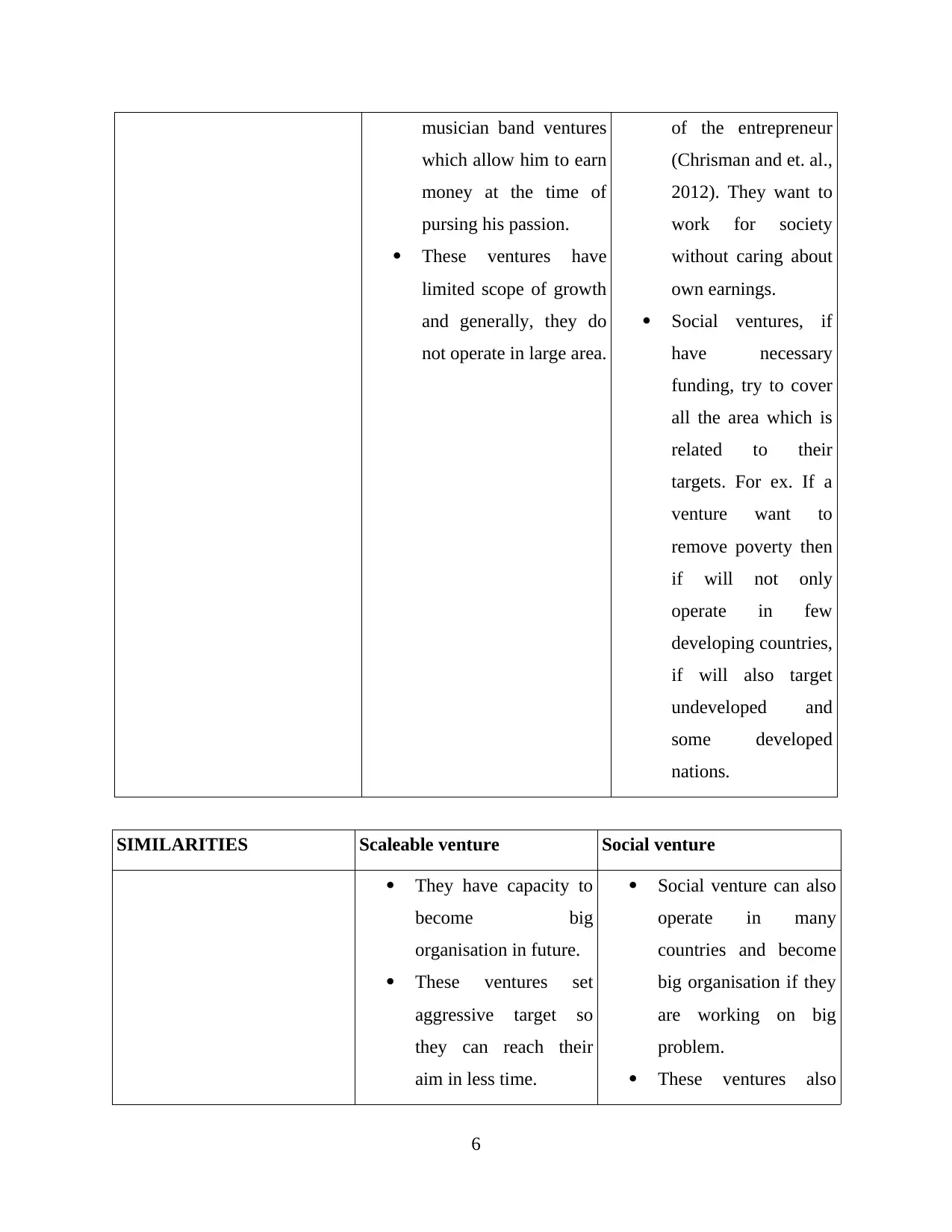
musician band ventures
which allow him to earn
money at the time of
pursing his passion.
These ventures have
limited scope of growth
and generally, they do
not operate in large area.
of the entrepreneur
(Chrisman and et. al.,
2012). They want to
work for society
without caring about
own earnings.
Social ventures, if
have necessary
funding, try to cover
all the area which is
related to their
targets. For ex. If a
venture want to
remove poverty then
if will not only
operate in few
developing countries,
if will also target
undeveloped and
some developed
nations.
SIMILARITIES Scaleable venture Social venture
They have capacity to
become big
organisation in future.
These ventures set
aggressive target so
they can reach their
aim in less time.
Social venture can also
operate in many
countries and become
big organisation if they
are working on big
problem.
These ventures also
6
which allow him to earn
money at the time of
pursing his passion.
These ventures have
limited scope of growth
and generally, they do
not operate in large area.
of the entrepreneur
(Chrisman and et. al.,
2012). They want to
work for society
without caring about
own earnings.
Social ventures, if
have necessary
funding, try to cover
all the area which is
related to their
targets. For ex. If a
venture want to
remove poverty then
if will not only
operate in few
developing countries,
if will also target
undeveloped and
some developed
nations.
SIMILARITIES Scaleable venture Social venture
They have capacity to
become big
organisation in future.
These ventures set
aggressive target so
they can reach their
aim in less time.
Social venture can also
operate in many
countries and become
big organisation if they
are working on big
problem.
These ventures also
6
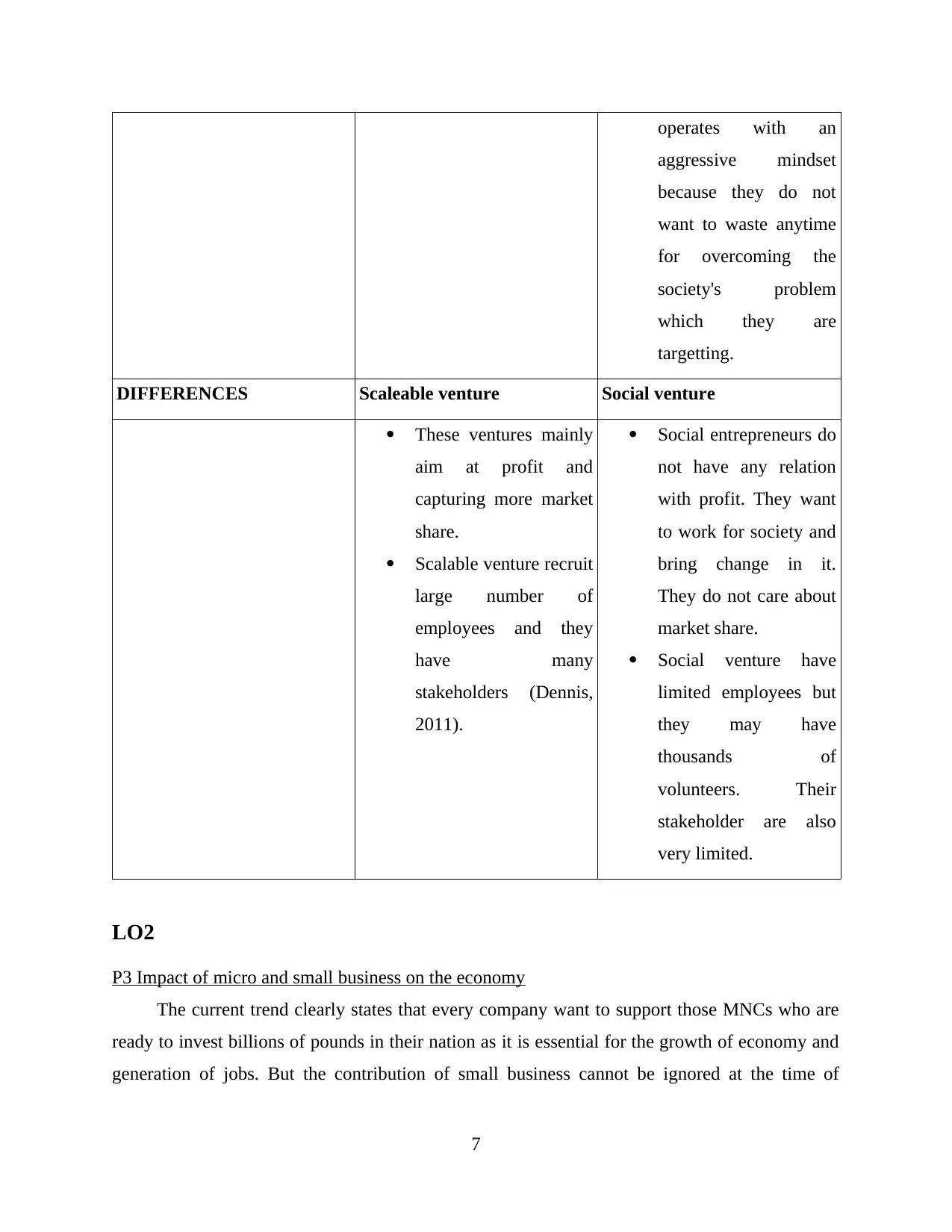
operates with an
aggressive mindset
because they do not
want to waste anytime
for overcoming the
society's problem
which they are
targetting.
DIFFERENCES Scaleable venture Social venture
These ventures mainly
aim at profit and
capturing more market
share.
Scalable venture recruit
large number of
employees and they
have many
stakeholders (Dennis,
2011).
Social entrepreneurs do
not have any relation
with profit. They want
to work for society and
bring change in it.
They do not care about
market share.
Social venture have
limited employees but
they may have
thousands of
volunteers. Their
stakeholder are also
very limited.
LO2
P3 Impact of micro and small business on the economy
The current trend clearly states that every company want to support those MNCs who are
ready to invest billions of pounds in their nation as it is essential for the growth of economy and
generation of jobs. But the contribution of small business cannot be ignored at the time of
7
aggressive mindset
because they do not
want to waste anytime
for overcoming the
society's problem
which they are
targetting.
DIFFERENCES Scaleable venture Social venture
These ventures mainly
aim at profit and
capturing more market
share.
Scalable venture recruit
large number of
employees and they
have many
stakeholders (Dennis,
2011).
Social entrepreneurs do
not have any relation
with profit. They want
to work for society and
bring change in it.
They do not care about
market share.
Social venture have
limited employees but
they may have
thousands of
volunteers. Their
stakeholder are also
very limited.
LO2
P3 Impact of micro and small business on the economy
The current trend clearly states that every company want to support those MNCs who are
ready to invest billions of pounds in their nation as it is essential for the growth of economy and
generation of jobs. But the contribution of small business cannot be ignored at the time of
7
Paraphrase This Document
Need a fresh take? Get an instant paraphrase of this document with our AI Paraphraser
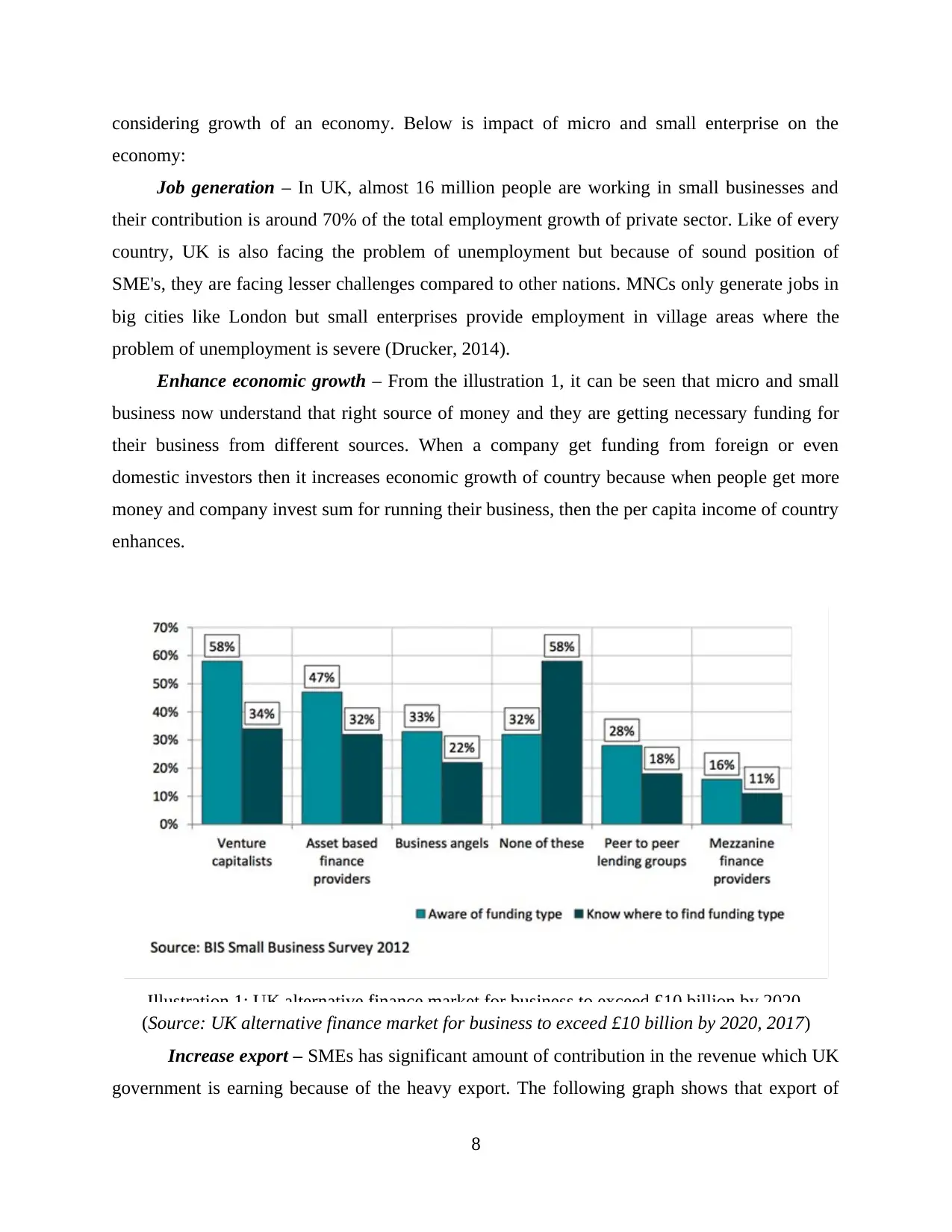
considering growth of an economy. Below is impact of micro and small enterprise on the
economy:
Job generation – In UK, almost 16 million people are working in small businesses and
their contribution is around 70% of the total employment growth of private sector. Like of every
country, UK is also facing the problem of unemployment but because of sound position of
SME's, they are facing lesser challenges compared to other nations. MNCs only generate jobs in
big cities like London but small enterprises provide employment in village areas where the
problem of unemployment is severe (Drucker, 2014).
Enhance economic growth – From the illustration 1, it can be seen that micro and small
business now understand that right source of money and they are getting necessary funding for
their business from different sources. When a company get funding from foreign or even
domestic investors then it increases economic growth of country because when people get more
money and company invest sum for running their business, then the per capita income of country
enhances.
(Source: UK alternative finance market for business to exceed £10 billion by 2020, 2017)
Increase export – SMEs has significant amount of contribution in the revenue which UK
government is earning because of the heavy export. The following graph shows that export of
8
Illustration 1: UK alternative finance market for business to exceed £10 billion by 2020.
economy:
Job generation – In UK, almost 16 million people are working in small businesses and
their contribution is around 70% of the total employment growth of private sector. Like of every
country, UK is also facing the problem of unemployment but because of sound position of
SME's, they are facing lesser challenges compared to other nations. MNCs only generate jobs in
big cities like London but small enterprises provide employment in village areas where the
problem of unemployment is severe (Drucker, 2014).
Enhance economic growth – From the illustration 1, it can be seen that micro and small
business now understand that right source of money and they are getting necessary funding for
their business from different sources. When a company get funding from foreign or even
domestic investors then it increases economic growth of country because when people get more
money and company invest sum for running their business, then the per capita income of country
enhances.
(Source: UK alternative finance market for business to exceed £10 billion by 2020, 2017)
Increase export – SMEs has significant amount of contribution in the revenue which UK
government is earning because of the heavy export. The following graph shows that export of
8
Illustration 1: UK alternative finance market for business to exceed £10 billion by 2020.
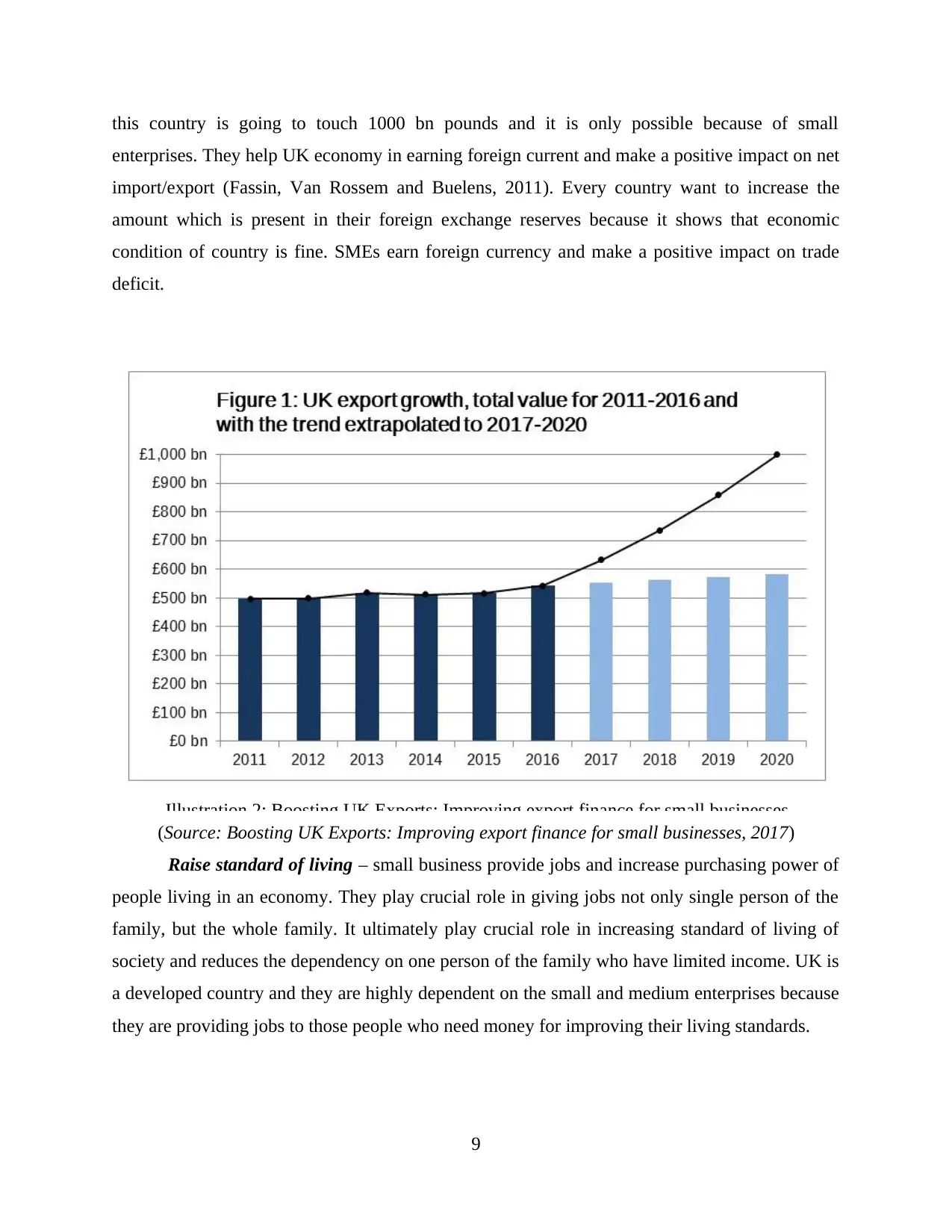
this country is going to touch 1000 bn pounds and it is only possible because of small
enterprises. They help UK economy in earning foreign current and make a positive impact on net
import/export (Fassin, Van Rossem and Buelens, 2011). Every country want to increase the
amount which is present in their foreign exchange reserves because it shows that economic
condition of country is fine. SMEs earn foreign currency and make a positive impact on trade
deficit.
(Source: Boosting UK Exports: Improving export finance for small businesses, 2017)
Raise standard of living – small business provide jobs and increase purchasing power of
people living in an economy. They play crucial role in giving jobs not only single person of the
family, but the whole family. It ultimately play crucial role in increasing standard of living of
society and reduces the dependency on one person of the family who have limited income. UK is
a developed country and they are highly dependent on the small and medium enterprises because
they are providing jobs to those people who need money for improving their living standards.
9
Illustration 2: Boosting UK Exports: Improving export finance for small businesses
enterprises. They help UK economy in earning foreign current and make a positive impact on net
import/export (Fassin, Van Rossem and Buelens, 2011). Every country want to increase the
amount which is present in their foreign exchange reserves because it shows that economic
condition of country is fine. SMEs earn foreign currency and make a positive impact on trade
deficit.
(Source: Boosting UK Exports: Improving export finance for small businesses, 2017)
Raise standard of living – small business provide jobs and increase purchasing power of
people living in an economy. They play crucial role in giving jobs not only single person of the
family, but the whole family. It ultimately play crucial role in increasing standard of living of
society and reduces the dependency on one person of the family who have limited income. UK is
a developed country and they are highly dependent on the small and medium enterprises because
they are providing jobs to those people who need money for improving their living standards.
9
Illustration 2: Boosting UK Exports: Improving export finance for small businesses
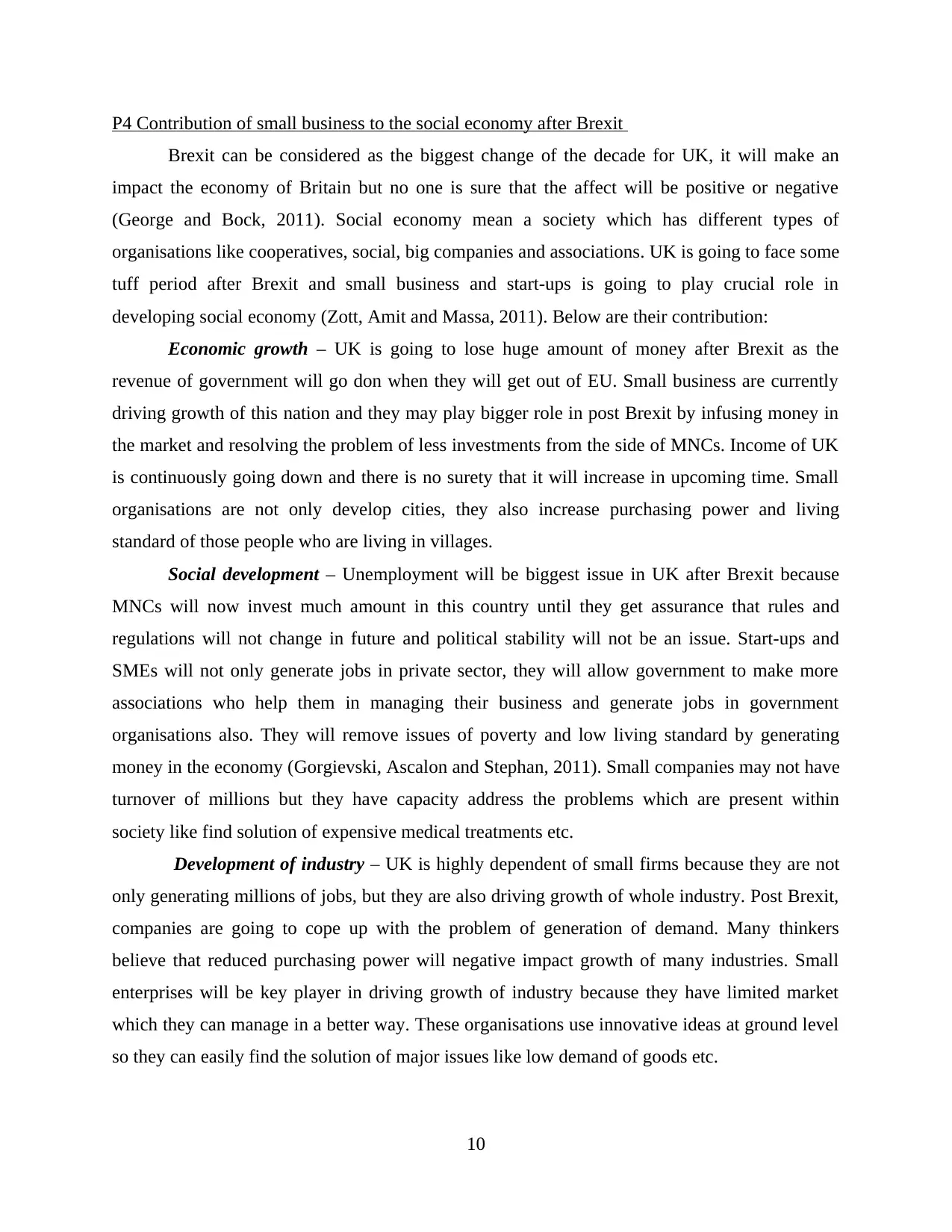
P4 Contribution of small business to the social economy after Brexit
Brexit can be considered as the biggest change of the decade for UK, it will make an
impact the economy of Britain but no one is sure that the affect will be positive or negative
(George and Bock, 2011). Social economy mean a society which has different types of
organisations like cooperatives, social, big companies and associations. UK is going to face some
tuff period after Brexit and small business and start-ups is going to play crucial role in
developing social economy (Zott, Amit and Massa, 2011). Below are their contribution:
Economic growth – UK is going to lose huge amount of money after Brexit as the
revenue of government will go don when they will get out of EU. Small business are currently
driving growth of this nation and they may play bigger role in post Brexit by infusing money in
the market and resolving the problem of less investments from the side of MNCs. Income of UK
is continuously going down and there is no surety that it will increase in upcoming time. Small
organisations are not only develop cities, they also increase purchasing power and living
standard of those people who are living in villages.
Social development – Unemployment will be biggest issue in UK after Brexit because
MNCs will now invest much amount in this country until they get assurance that rules and
regulations will not change in future and political stability will not be an issue. Start-ups and
SMEs will not only generate jobs in private sector, they will allow government to make more
associations who help them in managing their business and generate jobs in government
organisations also. They will remove issues of poverty and low living standard by generating
money in the economy (Gorgievski, Ascalon and Stephan, 2011). Small companies may not have
turnover of millions but they have capacity address the problems which are present within
society like find solution of expensive medical treatments etc.
Development of industry – UK is highly dependent of small firms because they are not
only generating millions of jobs, but they are also driving growth of whole industry. Post Brexit,
companies are going to cope up with the problem of generation of demand. Many thinkers
believe that reduced purchasing power will negative impact growth of many industries. Small
enterprises will be key player in driving growth of industry because they have limited market
which they can manage in a better way. These organisations use innovative ideas at ground level
so they can easily find the solution of major issues like low demand of goods etc.
10
Brexit can be considered as the biggest change of the decade for UK, it will make an
impact the economy of Britain but no one is sure that the affect will be positive or negative
(George and Bock, 2011). Social economy mean a society which has different types of
organisations like cooperatives, social, big companies and associations. UK is going to face some
tuff period after Brexit and small business and start-ups is going to play crucial role in
developing social economy (Zott, Amit and Massa, 2011). Below are their contribution:
Economic growth – UK is going to lose huge amount of money after Brexit as the
revenue of government will go don when they will get out of EU. Small business are currently
driving growth of this nation and they may play bigger role in post Brexit by infusing money in
the market and resolving the problem of less investments from the side of MNCs. Income of UK
is continuously going down and there is no surety that it will increase in upcoming time. Small
organisations are not only develop cities, they also increase purchasing power and living
standard of those people who are living in villages.
Social development – Unemployment will be biggest issue in UK after Brexit because
MNCs will now invest much amount in this country until they get assurance that rules and
regulations will not change in future and political stability will not be an issue. Start-ups and
SMEs will not only generate jobs in private sector, they will allow government to make more
associations who help them in managing their business and generate jobs in government
organisations also. They will remove issues of poverty and low living standard by generating
money in the economy (Gorgievski, Ascalon and Stephan, 2011). Small companies may not have
turnover of millions but they have capacity address the problems which are present within
society like find solution of expensive medical treatments etc.
Development of industry – UK is highly dependent of small firms because they are not
only generating millions of jobs, but they are also driving growth of whole industry. Post Brexit,
companies are going to cope up with the problem of generation of demand. Many thinkers
believe that reduced purchasing power will negative impact growth of many industries. Small
enterprises will be key player in driving growth of industry because they have limited market
which they can manage in a better way. These organisations use innovative ideas at ground level
so they can easily find the solution of major issues like low demand of goods etc.
10
Secure Best Marks with AI Grader
Need help grading? Try our AI Grader for instant feedback on your assignments.
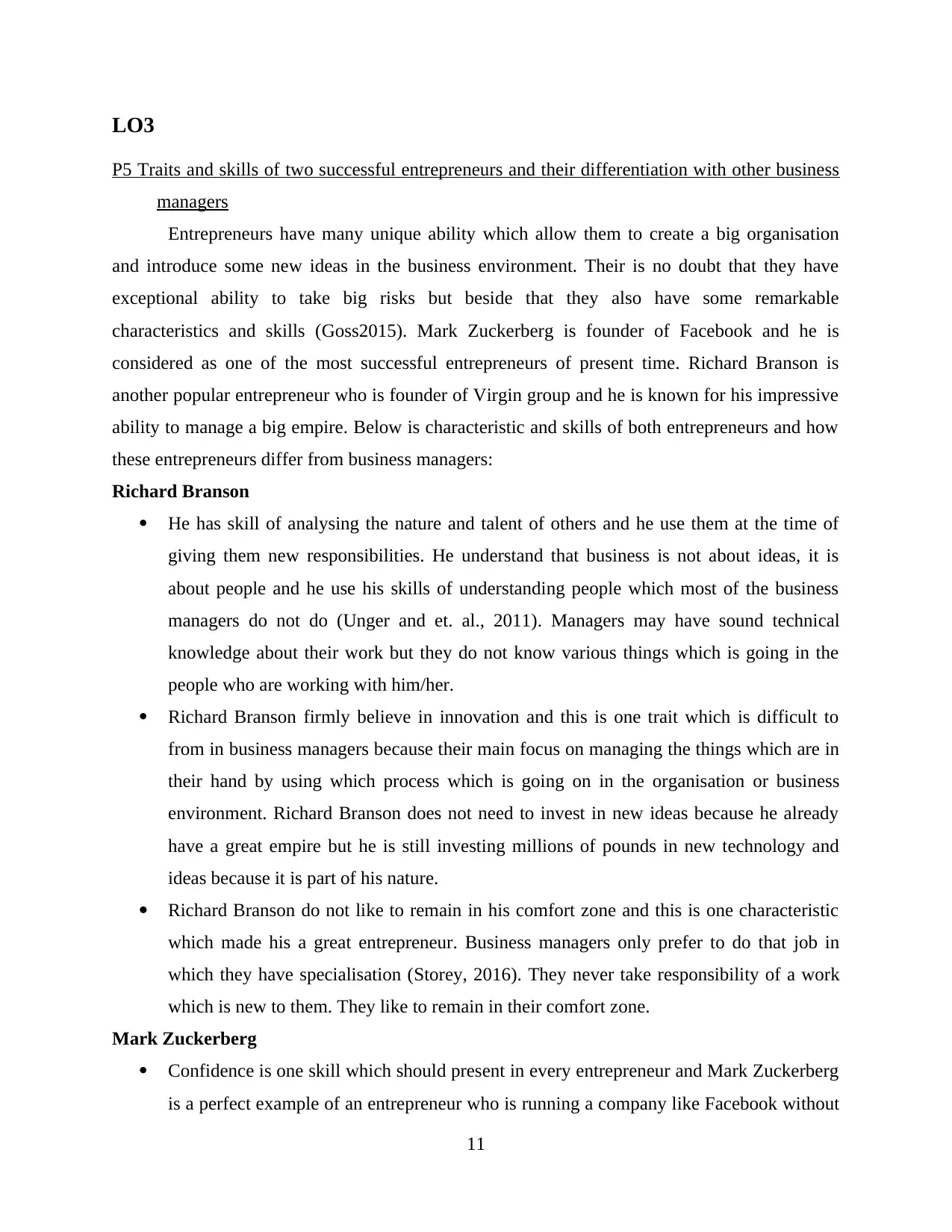
LO3
P5 Traits and skills of two successful entrepreneurs and their differentiation with other business
managers
Entrepreneurs have many unique ability which allow them to create a big organisation
and introduce some new ideas in the business environment. Their is no doubt that they have
exceptional ability to take big risks but beside that they also have some remarkable
characteristics and skills (Goss2015). Mark Zuckerberg is founder of Facebook and he is
considered as one of the most successful entrepreneurs of present time. Richard Branson is
another popular entrepreneur who is founder of Virgin group and he is known for his impressive
ability to manage a big empire. Below is characteristic and skills of both entrepreneurs and how
these entrepreneurs differ from business managers:
Richard Branson
He has skill of analysing the nature and talent of others and he use them at the time of
giving them new responsibilities. He understand that business is not about ideas, it is
about people and he use his skills of understanding people which most of the business
managers do not do (Unger and et. al., 2011). Managers may have sound technical
knowledge about their work but they do not know various things which is going in the
people who are working with him/her.
Richard Branson firmly believe in innovation and this is one trait which is difficult to
from in business managers because their main focus on managing the things which are in
their hand by using which process which is going on in the organisation or business
environment. Richard Branson does not need to invest in new ideas because he already
have a great empire but he is still investing millions of pounds in new technology and
ideas because it is part of his nature.
Richard Branson do not like to remain in his comfort zone and this is one characteristic
which made his a great entrepreneur. Business managers only prefer to do that job in
which they have specialisation (Storey, 2016). They never take responsibility of a work
which is new to them. They like to remain in their comfort zone.
Mark Zuckerberg
Confidence is one skill which should present in every entrepreneur and Mark Zuckerberg
is a perfect example of an entrepreneur who is running a company like Facebook without
11
P5 Traits and skills of two successful entrepreneurs and their differentiation with other business
managers
Entrepreneurs have many unique ability which allow them to create a big organisation
and introduce some new ideas in the business environment. Their is no doubt that they have
exceptional ability to take big risks but beside that they also have some remarkable
characteristics and skills (Goss2015). Mark Zuckerberg is founder of Facebook and he is
considered as one of the most successful entrepreneurs of present time. Richard Branson is
another popular entrepreneur who is founder of Virgin group and he is known for his impressive
ability to manage a big empire. Below is characteristic and skills of both entrepreneurs and how
these entrepreneurs differ from business managers:
Richard Branson
He has skill of analysing the nature and talent of others and he use them at the time of
giving them new responsibilities. He understand that business is not about ideas, it is
about people and he use his skills of understanding people which most of the business
managers do not do (Unger and et. al., 2011). Managers may have sound technical
knowledge about their work but they do not know various things which is going in the
people who are working with him/her.
Richard Branson firmly believe in innovation and this is one trait which is difficult to
from in business managers because their main focus on managing the things which are in
their hand by using which process which is going on in the organisation or business
environment. Richard Branson does not need to invest in new ideas because he already
have a great empire but he is still investing millions of pounds in new technology and
ideas because it is part of his nature.
Richard Branson do not like to remain in his comfort zone and this is one characteristic
which made his a great entrepreneur. Business managers only prefer to do that job in
which they have specialisation (Storey, 2016). They never take responsibility of a work
which is new to them. They like to remain in their comfort zone.
Mark Zuckerberg
Confidence is one skill which should present in every entrepreneur and Mark Zuckerberg
is a perfect example of an entrepreneur who is running a company like Facebook without
11
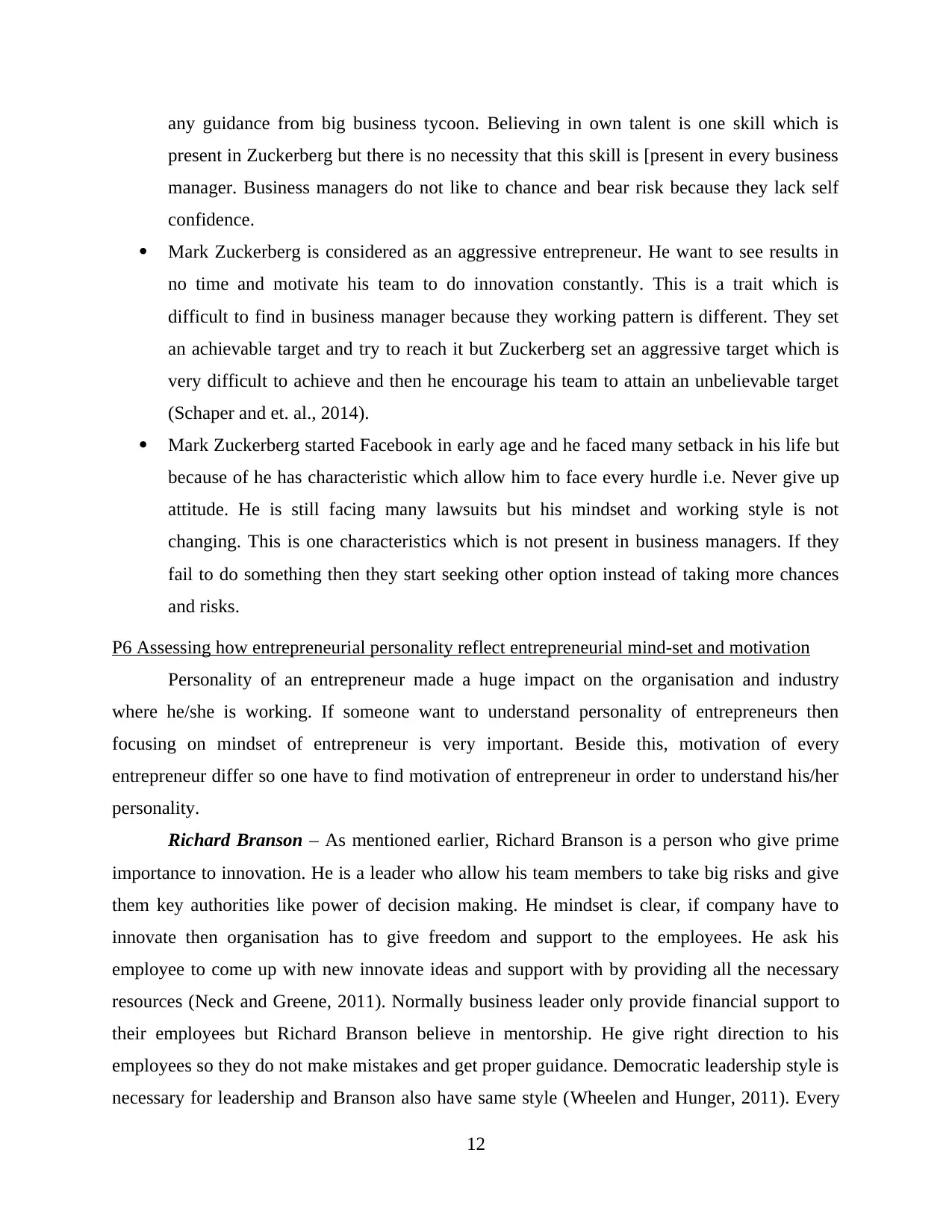
any guidance from big business tycoon. Believing in own talent is one skill which is
present in Zuckerberg but there is no necessity that this skill is [present in every business
manager. Business managers do not like to chance and bear risk because they lack self
confidence.
Mark Zuckerberg is considered as an aggressive entrepreneur. He want to see results in
no time and motivate his team to do innovation constantly. This is a trait which is
difficult to find in business manager because they working pattern is different. They set
an achievable target and try to reach it but Zuckerberg set an aggressive target which is
very difficult to achieve and then he encourage his team to attain an unbelievable target
(Schaper and et. al., 2014).
Mark Zuckerberg started Facebook in early age and he faced many setback in his life but
because of he has characteristic which allow him to face every hurdle i.e. Never give up
attitude. He is still facing many lawsuits but his mindset and working style is not
changing. This is one characteristics which is not present in business managers. If they
fail to do something then they start seeking other option instead of taking more chances
and risks.
P6 Assessing how entrepreneurial personality reflect entrepreneurial mind-set and motivation
Personality of an entrepreneur made a huge impact on the organisation and industry
where he/she is working. If someone want to understand personality of entrepreneurs then
focusing on mindset of entrepreneur is very important. Beside this, motivation of every
entrepreneur differ so one have to find motivation of entrepreneur in order to understand his/her
personality.
Richard Branson – As mentioned earlier, Richard Branson is a person who give prime
importance to innovation. He is a leader who allow his team members to take big risks and give
them key authorities like power of decision making. He mindset is clear, if company have to
innovate then organisation has to give freedom and support to the employees. He ask his
employee to come up with new innovate ideas and support with by providing all the necessary
resources (Neck and Greene, 2011). Normally business leader only provide financial support to
their employees but Richard Branson believe in mentorship. He give right direction to his
employees so they do not make mistakes and get proper guidance. Democratic leadership style is
necessary for leadership and Branson also have same style (Wheelen and Hunger, 2011). Every
12
present in Zuckerberg but there is no necessity that this skill is [present in every business
manager. Business managers do not like to chance and bear risk because they lack self
confidence.
Mark Zuckerberg is considered as an aggressive entrepreneur. He want to see results in
no time and motivate his team to do innovation constantly. This is a trait which is
difficult to find in business manager because they working pattern is different. They set
an achievable target and try to reach it but Zuckerberg set an aggressive target which is
very difficult to achieve and then he encourage his team to attain an unbelievable target
(Schaper and et. al., 2014).
Mark Zuckerberg started Facebook in early age and he faced many setback in his life but
because of he has characteristic which allow him to face every hurdle i.e. Never give up
attitude. He is still facing many lawsuits but his mindset and working style is not
changing. This is one characteristics which is not present in business managers. If they
fail to do something then they start seeking other option instead of taking more chances
and risks.
P6 Assessing how entrepreneurial personality reflect entrepreneurial mind-set and motivation
Personality of an entrepreneur made a huge impact on the organisation and industry
where he/she is working. If someone want to understand personality of entrepreneurs then
focusing on mindset of entrepreneur is very important. Beside this, motivation of every
entrepreneur differ so one have to find motivation of entrepreneur in order to understand his/her
personality.
Richard Branson – As mentioned earlier, Richard Branson is a person who give prime
importance to innovation. He is a leader who allow his team members to take big risks and give
them key authorities like power of decision making. He mindset is clear, if company have to
innovate then organisation has to give freedom and support to the employees. He ask his
employee to come up with new innovate ideas and support with by providing all the necessary
resources (Neck and Greene, 2011). Normally business leader only provide financial support to
their employees but Richard Branson believe in mentorship. He give right direction to his
employees so they do not make mistakes and get proper guidance. Democratic leadership style is
necessary for leadership and Branson also have same style (Wheelen and Hunger, 2011). Every
12
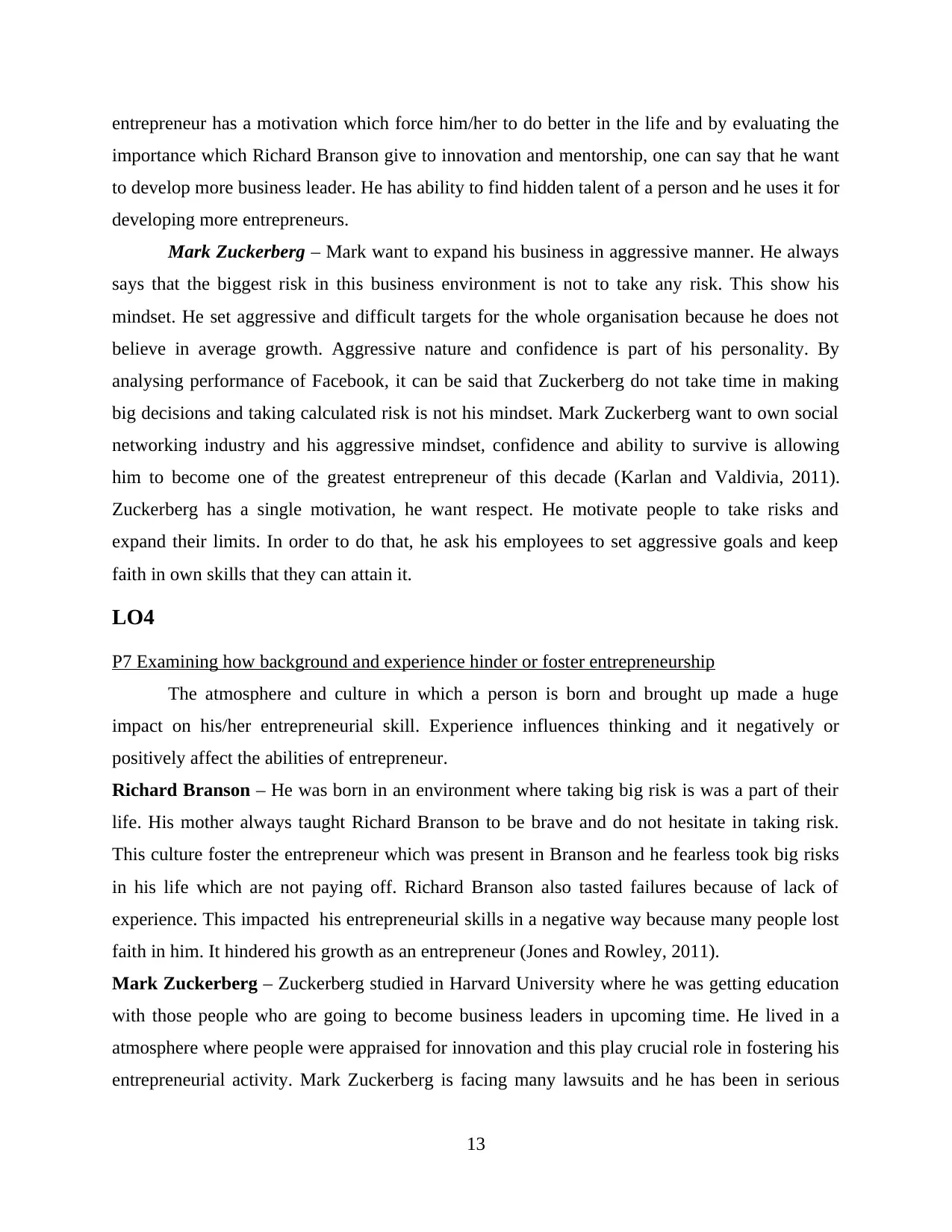
entrepreneur has a motivation which force him/her to do better in the life and by evaluating the
importance which Richard Branson give to innovation and mentorship, one can say that he want
to develop more business leader. He has ability to find hidden talent of a person and he uses it for
developing more entrepreneurs.
Mark Zuckerberg – Mark want to expand his business in aggressive manner. He always
says that the biggest risk in this business environment is not to take any risk. This show his
mindset. He set aggressive and difficult targets for the whole organisation because he does not
believe in average growth. Aggressive nature and confidence is part of his personality. By
analysing performance of Facebook, it can be said that Zuckerberg do not take time in making
big decisions and taking calculated risk is not his mindset. Mark Zuckerberg want to own social
networking industry and his aggressive mindset, confidence and ability to survive is allowing
him to become one of the greatest entrepreneur of this decade (Karlan and Valdivia, 2011).
Zuckerberg has a single motivation, he want respect. He motivate people to take risks and
expand their limits. In order to do that, he ask his employees to set aggressive goals and keep
faith in own skills that they can attain it.
LO4
P7 Examining how background and experience hinder or foster entrepreneurship
The atmosphere and culture in which a person is born and brought up made a huge
impact on his/her entrepreneurial skill. Experience influences thinking and it negatively or
positively affect the abilities of entrepreneur.
Richard Branson – He was born in an environment where taking big risk is was a part of their
life. His mother always taught Richard Branson to be brave and do not hesitate in taking risk.
This culture foster the entrepreneur which was present in Branson and he fearless took big risks
in his life which are not paying off. Richard Branson also tasted failures because of lack of
experience. This impacted his entrepreneurial skills in a negative way because many people lost
faith in him. It hindered his growth as an entrepreneur (Jones and Rowley, 2011).
Mark Zuckerberg – Zuckerberg studied in Harvard University where he was getting education
with those people who are going to become business leaders in upcoming time. He lived in a
atmosphere where people were appraised for innovation and this play crucial role in fostering his
entrepreneurial activity. Mark Zuckerberg is facing many lawsuits and he has been in serious
13
importance which Richard Branson give to innovation and mentorship, one can say that he want
to develop more business leader. He has ability to find hidden talent of a person and he uses it for
developing more entrepreneurs.
Mark Zuckerberg – Mark want to expand his business in aggressive manner. He always
says that the biggest risk in this business environment is not to take any risk. This show his
mindset. He set aggressive and difficult targets for the whole organisation because he does not
believe in average growth. Aggressive nature and confidence is part of his personality. By
analysing performance of Facebook, it can be said that Zuckerberg do not take time in making
big decisions and taking calculated risk is not his mindset. Mark Zuckerberg want to own social
networking industry and his aggressive mindset, confidence and ability to survive is allowing
him to become one of the greatest entrepreneur of this decade (Karlan and Valdivia, 2011).
Zuckerberg has a single motivation, he want respect. He motivate people to take risks and
expand their limits. In order to do that, he ask his employees to set aggressive goals and keep
faith in own skills that they can attain it.
LO4
P7 Examining how background and experience hinder or foster entrepreneurship
The atmosphere and culture in which a person is born and brought up made a huge
impact on his/her entrepreneurial skill. Experience influences thinking and it negatively or
positively affect the abilities of entrepreneur.
Richard Branson – He was born in an environment where taking big risk is was a part of their
life. His mother always taught Richard Branson to be brave and do not hesitate in taking risk.
This culture foster the entrepreneur which was present in Branson and he fearless took big risks
in his life which are not paying off. Richard Branson also tasted failures because of lack of
experience. This impacted his entrepreneurial skills in a negative way because many people lost
faith in him. It hindered his growth as an entrepreneur (Jones and Rowley, 2011).
Mark Zuckerberg – Zuckerberg studied in Harvard University where he was getting education
with those people who are going to become business leaders in upcoming time. He lived in a
atmosphere where people were appraised for innovation and this play crucial role in fostering his
entrepreneurial activity. Mark Zuckerberg is facing many lawsuits and he has been in serious
13
Paraphrase This Document
Need a fresh take? Get an instant paraphrase of this document with our AI Paraphraser
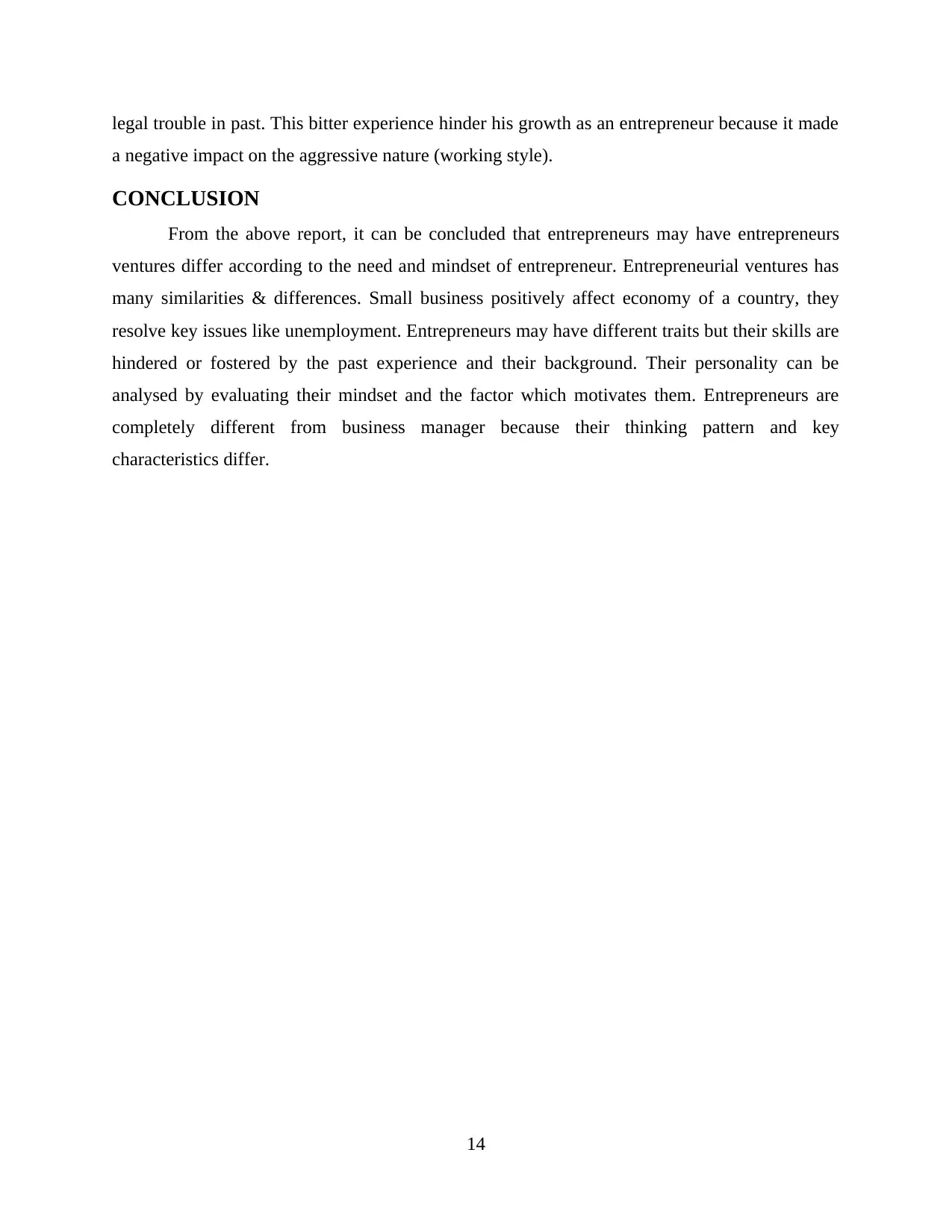
legal trouble in past. This bitter experience hinder his growth as an entrepreneur because it made
a negative impact on the aggressive nature (working style).
CONCLUSION
From the above report, it can be concluded that entrepreneurs may have entrepreneurs
ventures differ according to the need and mindset of entrepreneur. Entrepreneurial ventures has
many similarities & differences. Small business positively affect economy of a country, they
resolve key issues like unemployment. Entrepreneurs may have different traits but their skills are
hindered or fostered by the past experience and their background. Their personality can be
analysed by evaluating their mindset and the factor which motivates them. Entrepreneurs are
completely different from business manager because their thinking pattern and key
characteristics differ.
14
a negative impact on the aggressive nature (working style).
CONCLUSION
From the above report, it can be concluded that entrepreneurs may have entrepreneurs
ventures differ according to the need and mindset of entrepreneur. Entrepreneurial ventures has
many similarities & differences. Small business positively affect economy of a country, they
resolve key issues like unemployment. Entrepreneurs may have different traits but their skills are
hindered or fostered by the past experience and their background. Their personality can be
analysed by evaluating their mindset and the factor which motivates them. Entrepreneurs are
completely different from business manager because their thinking pattern and key
characteristics differ.
14
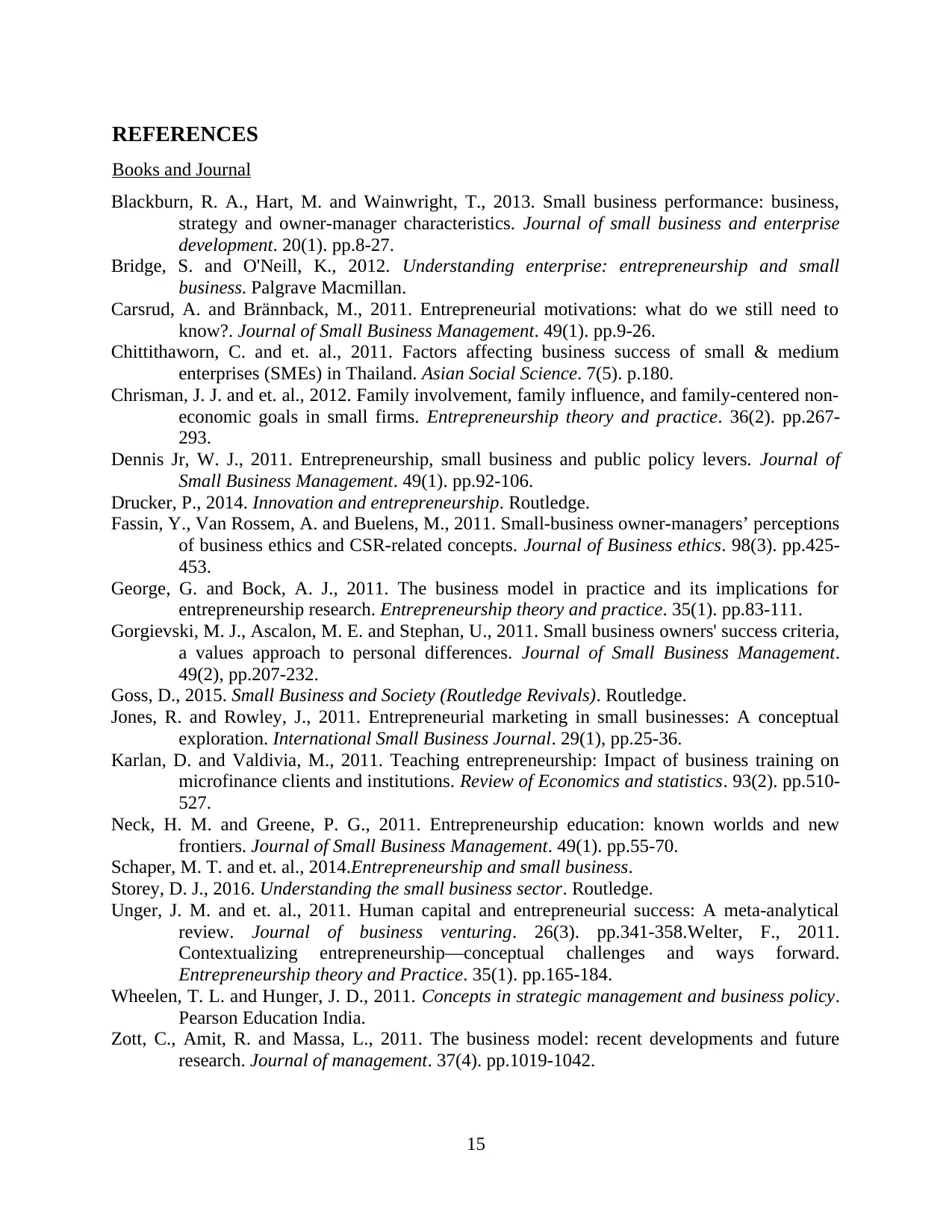
REFERENCES
Books and Journal
Blackburn, R. A., Hart, M. and Wainwright, T., 2013. Small business performance: business,
strategy and owner-manager characteristics. Journal of small business and enterprise
development. 20(1). pp.8-27.
Bridge, S. and O'Neill, K., 2012. Understanding enterprise: entrepreneurship and small
business. Palgrave Macmillan.
Carsrud, A. and Brännback, M., 2011. Entrepreneurial motivations: what do we still need to
know?. Journal of Small Business Management. 49(1). pp.9-26.
Chittithaworn, C. and et. al., 2011. Factors affecting business success of small & medium
enterprises (SMEs) in Thailand. Asian Social Science. 7(5). p.180.
Chrisman, J. J. and et. al., 2012. Family involvement, family influence, and family‐centered non‐
economic goals in small firms. Entrepreneurship theory and practice. 36(2). pp.267-
293.
Dennis Jr, W. J., 2011. Entrepreneurship, small business and public policy levers. Journal of
Small Business Management. 49(1). pp.92-106.
Drucker, P., 2014. Innovation and entrepreneurship. Routledge.
Fassin, Y., Van Rossem, A. and Buelens, M., 2011. Small-business owner-managers’ perceptions
of business ethics and CSR-related concepts. Journal of Business ethics. 98(3). pp.425-
453.
George, G. and Bock, A. J., 2011. The business model in practice and its implications for
entrepreneurship research. Entrepreneurship theory and practice. 35(1). pp.83-111.
Gorgievski, M. J., Ascalon, M. E. and Stephan, U., 2011. Small business owners' success criteria,
a values approach to personal differences. Journal of Small Business Management.
49(2), pp.207-232.
Goss, D., 2015. Small Business and Society (Routledge Revivals). Routledge.
Jones, R. and Rowley, J., 2011. Entrepreneurial marketing in small businesses: A conceptual
exploration. International Small Business Journal. 29(1), pp.25-36.
Karlan, D. and Valdivia, M., 2011. Teaching entrepreneurship: Impact of business training on
microfinance clients and institutions. Review of Economics and statistics. 93(2). pp.510-
527.
Neck, H. M. and Greene, P. G., 2011. Entrepreneurship education: known worlds and new
frontiers. Journal of Small Business Management. 49(1). pp.55-70.
Schaper, M. T. and et. al., 2014.Entrepreneurship and small business.
Storey, D. J., 2016. Understanding the small business sector. Routledge.
Unger, J. M. and et. al., 2011. Human capital and entrepreneurial success: A meta-analytical
review. Journal of business venturing. 26(3). pp.341-358.Welter, F., 2011.
Contextualizing entrepreneurship—conceptual challenges and ways forward.
Entrepreneurship theory and Practice. 35(1). pp.165-184.
Wheelen, T. L. and Hunger, J. D., 2011. Concepts in strategic management and business policy.
Pearson Education India.
Zott, C., Amit, R. and Massa, L., 2011. The business model: recent developments and future
research. Journal of management. 37(4). pp.1019-1042.
15
Books and Journal
Blackburn, R. A., Hart, M. and Wainwright, T., 2013. Small business performance: business,
strategy and owner-manager characteristics. Journal of small business and enterprise
development. 20(1). pp.8-27.
Bridge, S. and O'Neill, K., 2012. Understanding enterprise: entrepreneurship and small
business. Palgrave Macmillan.
Carsrud, A. and Brännback, M., 2011. Entrepreneurial motivations: what do we still need to
know?. Journal of Small Business Management. 49(1). pp.9-26.
Chittithaworn, C. and et. al., 2011. Factors affecting business success of small & medium
enterprises (SMEs) in Thailand. Asian Social Science. 7(5). p.180.
Chrisman, J. J. and et. al., 2012. Family involvement, family influence, and family‐centered non‐
economic goals in small firms. Entrepreneurship theory and practice. 36(2). pp.267-
293.
Dennis Jr, W. J., 2011. Entrepreneurship, small business and public policy levers. Journal of
Small Business Management. 49(1). pp.92-106.
Drucker, P., 2014. Innovation and entrepreneurship. Routledge.
Fassin, Y., Van Rossem, A. and Buelens, M., 2011. Small-business owner-managers’ perceptions
of business ethics and CSR-related concepts. Journal of Business ethics. 98(3). pp.425-
453.
George, G. and Bock, A. J., 2011. The business model in practice and its implications for
entrepreneurship research. Entrepreneurship theory and practice. 35(1). pp.83-111.
Gorgievski, M. J., Ascalon, M. E. and Stephan, U., 2011. Small business owners' success criteria,
a values approach to personal differences. Journal of Small Business Management.
49(2), pp.207-232.
Goss, D., 2015. Small Business and Society (Routledge Revivals). Routledge.
Jones, R. and Rowley, J., 2011. Entrepreneurial marketing in small businesses: A conceptual
exploration. International Small Business Journal. 29(1), pp.25-36.
Karlan, D. and Valdivia, M., 2011. Teaching entrepreneurship: Impact of business training on
microfinance clients and institutions. Review of Economics and statistics. 93(2). pp.510-
527.
Neck, H. M. and Greene, P. G., 2011. Entrepreneurship education: known worlds and new
frontiers. Journal of Small Business Management. 49(1). pp.55-70.
Schaper, M. T. and et. al., 2014.Entrepreneurship and small business.
Storey, D. J., 2016. Understanding the small business sector. Routledge.
Unger, J. M. and et. al., 2011. Human capital and entrepreneurial success: A meta-analytical
review. Journal of business venturing. 26(3). pp.341-358.Welter, F., 2011.
Contextualizing entrepreneurship—conceptual challenges and ways forward.
Entrepreneurship theory and Practice. 35(1). pp.165-184.
Wheelen, T. L. and Hunger, J. D., 2011. Concepts in strategic management and business policy.
Pearson Education India.
Zott, C., Amit, R. and Massa, L., 2011. The business model: recent developments and future
research. Journal of management. 37(4). pp.1019-1042.
15

Online
Boosting UK Exports: Improving export finance for small businesses. 2017.[Online]. Available
through:<http://www.civitas.org.uk/reports_articles/boosting-uk-exports-improving-
export-finance-for-small-businesses/>.
UK alternative finance market for business to exceed £10 billion by 2020. 2017.[Online].
Available through:<https://www.paymentscardsandmobile.com/uk-alternative-finance-
market-for-business-to-exceed-10-billion-by-2020/>.
16
Boosting UK Exports: Improving export finance for small businesses. 2017.[Online]. Available
through:<http://www.civitas.org.uk/reports_articles/boosting-uk-exports-improving-
export-finance-for-small-businesses/>.
UK alternative finance market for business to exceed £10 billion by 2020. 2017.[Online].
Available through:<https://www.paymentscardsandmobile.com/uk-alternative-finance-
market-for-business-to-exceed-10-billion-by-2020/>.
16
1 out of 16
Related Documents
Your All-in-One AI-Powered Toolkit for Academic Success.
+13062052269
info@desklib.com
Available 24*7 on WhatsApp / Email
![[object Object]](/_next/static/media/star-bottom.7253800d.svg)
Unlock your academic potential
© 2024 | Zucol Services PVT LTD | All rights reserved.




